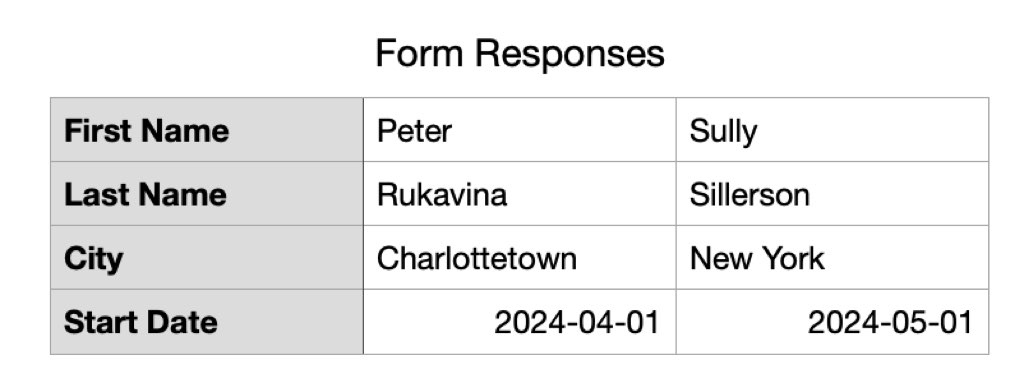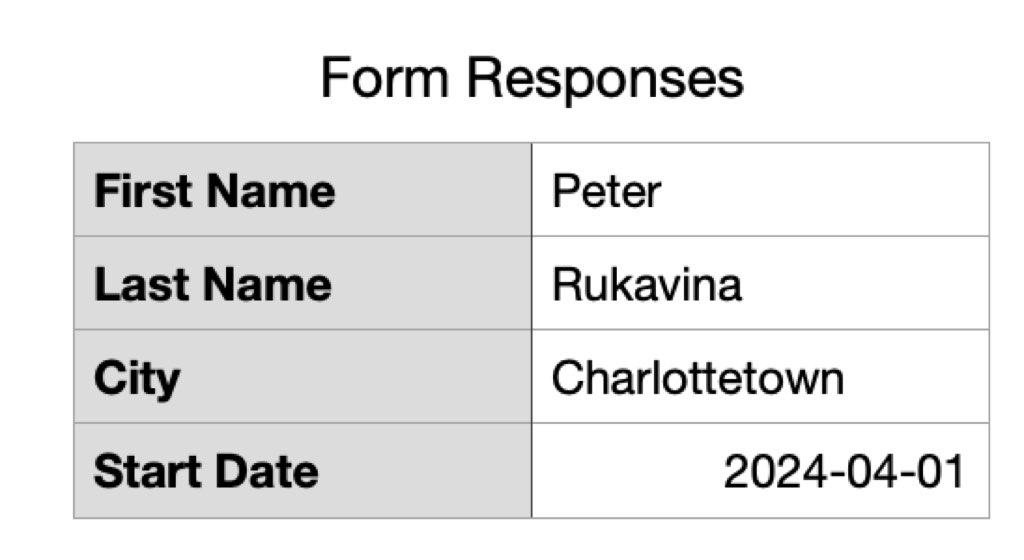I’ve been scheduling interviews for the last few days, and part of that job has involved taking a spreadsheet exported from Typeform (where we collected responses to a questionnaire from candidates) and trying to find a way to make a report from it.
You’d think this would be easy, the kind of thing people do in offices all day long.
All I want to do is take this:
First Name,Last Name,City,Start Date Peter,Rukavina,Charlottetown,2024-04-01 Sully,Sillerson,New York,2024-05-01
And turn it into this:
First Name: Peter Last Name: Rukavina City: Charlottetown Start Date: 2024-04-01
With one person’s details on each page.
I can sort of do that by loading the spreadsheet into Numbers and selecting Table > Transpose Rows and Columns. This gets me halfway there; from that point, I can selectively hide and show columns, print each, and get where I want to go.



But surely.
My second real computer job, when I was 16 years old, was at the Canadian Tire store in Burlington, Ontario. I started off working there on the sales floor, selling Commodore VIC-20s to the unsuspecting; eventually I was moved upstairs to the comptroller’s office, where a copy of the newly-released Lotus 1-2-3 had recently arrived.
Lotus 1-2-3 was amazing. It’s hard to convey just how amazing it was to my teenaged eyes, but I loved it, and loved figuring out how to make it do all sorts of amazing things. Canadian Tire was able to learn much about itself because of my work, from how productive their mechanics were to gaining insights into wages vs. sales. Along the way I learned a lot about Canadian Tire, and business, about spreadsheets, and about how to be a computer consultant.
Using Numbers, more than 40 years later, isn’t much different than using Lotus 1-2-3 back then. There certainly hasn’t been 40 years worth of innovation or creativity applied to the category.
The underlying issue here, of course, is that Numbers is a spreadsheet, whereas what I really want is a database manager. Indeed, I made a good living from being a dBASE manager for much of my 20s.
Producing reports was one of the things dBASE did well, and what I really want is its modern equivalent.
But apparently there isn’t one. Whereas VisiCalc begat Lotus 1-2-3 begat Numbers, it seems like FileMaker and dBASE and their ilk are a category of consumer software that died on the vine.
(Technically FileMaker didn’t die, it just became something else: an $800 piece of enterprise software that can, indeed, produce a report from an imported spreadsheet.)
What do people do these days when they want to keep track of generic things, search for those things, report on those things, share those things?
When did computers on our desks stop being able to do that?
 I am
I am
Comments
Check out this video from
Check out this video from MacMost. I believe you can do what you want with a little bit of scripting.
https://www.youtube.com/watch?v=685LWoSOAkU
I can't edit my previous
I can't edit my previous reply, so I'll add this. You might want to look at Tinderbox from Eastgate Systems (http://www.eastgate.com/Tinderbox/). Although it may look like a mind-mapping app from the screenshots, it's also a powerful outliner, where notes have "attributes" which are basically the same as records and fields. There is a flexible, programmable export facility, and notes can be created, sorted, filtered and arranged through a powerful scripting language. James Fallows of The Atlantic uses it, and it has a very active user community. (https://forum.eastgate.com)
I'm sure there are similar apps. They haven't gone away. I think they're just lost in the noise and the buzz of every new thing that comes along.
Thank you, Dave, for two
Thank you, Dave, for two helpful comments.
You remind me of another thread from my days as a VIC-20 salesperson: of the “things you can do with a computer” that Commodore pushed us to mention was “keeping track of your recipes,” a task more useful in theory than in practice. I think, in the end, the idea of a computer as “way to keep track of things” didn’t take off because most people aren’t motivated to keep track of things.
One of the first "serious"
One of the first "serious" software purchases for my Apple ][+ back in 1982 (I think I actually bought it as part of the bundle) was PFS: File.
Imagine my surprise when I learned you needed PFS: Report to actually do anything with it. 😜
People do like to make lists, and they like to sort and search. Our neighborhood "directory" comes as an Excel file every few weeks. It drives me nuts that they'll put two entries in a field and other "data format errors" that limit its usefulness. But all they want to do is search for an address or a name, and it's fine for that.
In fact, they get upset if you do anything else with it. But that's another story.
Hi Peter
Hi Peter
There are a bunch of no-code database apps out there. I’ve been using Airtable and have actually really enjoyed it. I’m not sure if there’s a free pricing tier. If not, others that are similar include: Rows, SmartSuite and maybe Zapier Tables
I'm still using Microsoft
I'm still using Microsoft Works after all these years, it's relatively simple to use, and the database does good reports.
Microsoft Access remains my
Microsoft Access remains my go to 25 years after discovering it. I’ve also toyed with the Google space because I wanted to make data entry possible from my iPhone. It was as you say cumbersome, imperfect and annoying 10 years ago but was thinking about looking at things again now.
A lot of my work these days
A lot of my work these days involves transforming this sort of data, but it's usually on a larger scale. I tend to reach for the Pandas library in Python (https://pandas.pydata.org) for loading and transformation tasks like the above.
I was discussing the falling from grace of FileMaker with a friend recently. It's not exactly the same, but I've really come to enjoy working with Retool (https://retool.com) for building form-based apps for clients. Again, this probably isn't the right tool for the scale of problem. I've also used AirTable (https://www.airtable.com) in the past, and it's been pleasant. It has an excellent API, and can be helpful as a staging ground for prototyping apps.
I've never tried it, but Panorama X from Provue looks like it might be closer to what you're looking for:https://www.provue.com
I feel like there’s not a great answer to your question these days, and it’s a shame! Hopefully some of this might be useful, though.
Add new comment